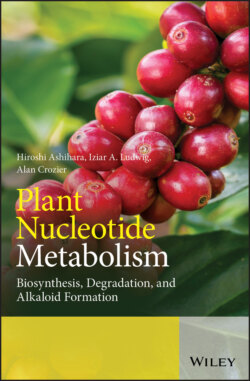Читать книгу Plant Nucleotide Metabolism - Hiroshi Ashihara - Страница 74
5.4.1 Adenosine Kinase
ОглавлениеAdenosine kinase (AK, ATP: adenosine-5′-phosphotransferase, EC 2.7.1.20) catalyses the phosphorylation of adenosine to AMP using ATP as the phosphate donor (reaction 2 in Figure 5.2). The enzyme was first isolated from yeast and animal tissues (Caputto, 1951; Kornberg and Pricer, 1951). AK is widely distributed in plant cells and tissues and there are reports on both purified native and recombinant enzymes (Table 5.3).
Table 5.3 Properties of the native and recombinant adenosine kinase (AK) and inosine/guanosine kinase (IGK) from plants.
| Km values (μM) | |||||||||||
| Enzyme | Enzyme source | Isozyme | Optimum pH | AR | ATP | tZR | iPR | DHZR | Gene | TAIR Locus | References |
| AK | Wheat germ | 6.8–7.2 | 8.7 | 31 | Chen and Eckert (1977) | ||||||
| Yellow lupin seedsa) | 7.0–7.5 | 1.5 | 300 | Guranowski (1979b) | |||||||
| Peach flower budsa) | 9.5 | 1.8 | 200 | Faye and Le Floc'h (1997) | |||||||
| Tobacco BY-2 cellsa) | Laukens et al. (2003) | ||||||||||
| Arabidopsis thaliana b) | ADK1 | 8.0 | 0.5 | 350 | 3.2 | adk1 | AT3G09820 | Moffatt et al. (2000) | |||
| ADK2 | 9.5 | 0.3 | 370 | 4.8 | adk2 | AT5G03300 | |||||
| Tobacco BY-2 cellsb) | ADK1T | 7.5 | 4.0 | 2.4 | 0.3 | 3.9 | adk1t | Kwade et al. (2005) | |||
| ADK1S | 7.0 | 1.9 | 2.5 | 6.1 | 3.9 | adk1s | |||||
| ADK2T | 8.5 | 7.3 | 3.2 | 8.7 | 2.6 | adk2t | |||||
| ADK2S | 8.8 | 3.9 | 2.2 | 1.7 | 3.8 | adk2s | |||||
| Physcomitrella (moss)b) | c) | von Schwartzenberg et al. (1998) | |||||||||
| IGK | IR | GR | XR | ATP | |||||||
| Jerusalem artichokea) | 7.6 | 70 | 14 | 1450 | Combés et al. (1989) | ||||||
| dNK | AdR | GdR | |||||||||
| A. thaliana b) | 14 | 27 | dnk | AT1G72040 | Clausen et al. (2012) |
AR, Adenosine; ATP, adenosine triphosphate. Cytokinin ribosides: DHZR, dihydrozeatin riboside; iPR, isopentenyladenosine; tZR, trans-zeatin riboside. IR, Inosine; GR, guanosine; XR, xanthosine; AdR, deoxyadenosine; GdR, deoxyguanosine.
a) Native enzyme.
b) Recombinant enzyme.
c) Activity was detected but no data was published on the Km value.
Almost homogeneous AK was isolated from seeds of yellow lupin (Lupinus luteus) by Guranowski (1979b). The Km value for adenosine was low (1.5 μM), but was higher (300 μM) for ATP. This trend is also found with AK from other plant sources (Table 5.3). ATP is the main phosphate donor. dATP and guanosine triphosphate (GTP) can substitute for ATP, but less effectively. AK has been investigated in the context of phosphorylation of cytokinins (see Part V).
Cloning and characterization of AK was first performed with the moss Physcomitrella patens (von Schwartzenberg et al. 1998). A gene adk was cloned from a cDNA library by functional complementation of an E. coli purine auxotrophic strain. The deduced amino acid sequence had a 52% homology with the human adk. Subsequently, cDNAs and genes encoding two isoforms of AK were isolated from A. thaliana (Moffatt et al. 2000). The adk1- and adk2-coding sequences were very similar sharing, respectively, 92% and 89% amino acid and nucleotide identity. Each cDNA was overexpressed in E. coli, and the catalytic activity of the two isoforms determined. Both AK isozymes have similar catalytic properties (Table 5.3). Four AK isoforms, designated 1S, 2S, 1T, and 2T have been identified in BY2 tobacco cells (Kwade et al. 2005). In contrast to AK from other plant sources, all four tobacco AK isoforms displayed a high affinity for adenosine and three cytokinin ribosides (see Part V).
